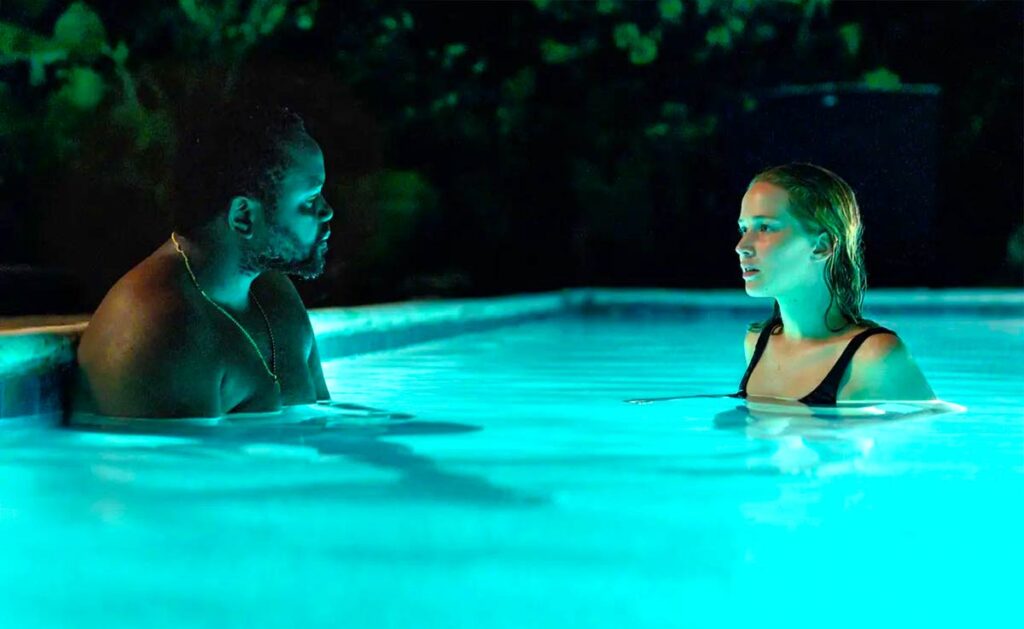There’s water, water everywhere in “Causeway,” the strong cinematic debut of accomplished theatre mainstay Lila Neugebauer — and oh so much to think about. The laconic Lynsey (a resurgent Jennifer Lawrence in what is plainly her career’s finest performance) explains that she’s drawn to water on a deep, source-of-all-life level while convincing a pool cleaning service’s manager to give her a job skimming scum and fixing filters. The camera likes to linger on these small oases of refreshment dotting the tonier homes of humid New Orleans, shot with more attention to the city’s physical and social outlay than most productions availing themselves of the state tax breaks. They glow like nuclear fuel rods in the night and turn into stagnant blue squares by day. At Lynsey’s home, an above-ground unit is in disrepair, and it falls to her to scrub it. Swimming pools emerge as the most blatant symbol in a film that’s just a tad too fond of them, their self-contained privacy an analog to the guarded isolation our protagonist wears like kevlar. By the time she’s made it out the other side of her overly prescribed arc, she’ll join everyone frolicking in a public swimming hole.
READ MORE: TIFF 2022: 16 Must-See Films To See At The Toronto Film Festival
The good news is that the clunkier writerly devices of the screenplay cooked up by Elizabeth Sanders, Luke Goebel, and it-novelist Ottessa Moshfegh are out of joint with the tender naturalism that enriches the rest of this downbeat two-hander. Consisting of little more than an organic, true-to-life conversation with the occasional flourish of formal elan — a slow-zoom monologue here, an emotional catharsis that plays out in complete silence there — the double character piece excels most when Neugebauer does her thing and facilitates her actors. Together, they build a pair of utterly real people, nonetheless confined to a dramatic universe more prone to contrivance. But the pleasures of the former generally outweigh the irksomeness of the latter, with Lawrence and costar Brian Tyree Henry joined in as a super-generator of onscreen magnetism.
READ MORE: Fall 2022 Preview: 60+ Must-See Films To Watch
Lynsey meets James at the auto body shop she rolls into with a smoking truck; like her, he repairs broken systems for a living. If only they could do the same for themselves, each hauling their respective trauma-related baggage to the tentative friendship inched into over hangouts bathed in idyllic Southern light. He lost his leg in a car crash, and his fiancée with it. She’s just been discharged from Afghanistan after a horrifying IED incident that left her with a cerebral hemorrhage and a long, hard road back to command of her body. Lawrence makes her second coming during the earliest, crudest phase of her rehabilitation, the raw physicality and sullen minimalism recalling the promise of “Winter’s Bone” that would eventually curdle into the hamminess of the David O. Russell era and a spotty, non-prolific back half of the ‘10s. (Needless to say, Mother! innocent.)

As the two withdrawn personalities gradually expose their vulnerable innards, an irresistible chemistry germinates between them, complicated by Lynsey’s gentle mention that she has girlfriends, not boyfriends. All the same, they joke around and confide with an intimacy that soon exceeds the usual county lines of friendship, a tension that the keyed-in performances and realistic dialogue stoke without scorching. Things keep to a low burn as they drive around the garden district, get sno-balls, smoke, and take the occasional dip in a vacant client’s pool. Someone in the screenwriting trio has a precise and affectionate knowledge of New Orleans’ cultural geography, and not just in the visits to local treasures like the Maple Leaf bar and Hansen’s Sno-Bliz. They relate to one another in a Nola-specific capacity, the chatter about which high school you went to and who knew whose mom accurate to the small-town vibe shared among natives of the major-league metropolis. (I’ve chosen to believe that Lynsey and James having literally gone to school on opposite sides of the St. Charles streetcar tracks is a very subtle pun for Crescent residents to enjoy.)
As the ambling “Before” Trilogy bonding gives way to a more structured resolution of character development, the film hits rockier stretches. The missing piece that solves Lynsey’s inner hurt materializes all too cleanly, though her epiphany illuminating her self-destructive relationship to service also occasions some deeply felt, unostentatious acting. Likewise, the obligatory late-second-act fight between the two steers the film toward a predictable route, even as it gives Henry his time to shine as he layers defensiveness over guilt over loneliness. Solitude is a look this film and its stars both wear well, comfortably carrying their heavy angst without wallowing in misery. A swimming pool may be an excuse to shut out the rest of the world, but as Dustin Hoffman so wisely said in “The Graduate,” “it’s very comfortable just to drift here.” For whatever inauthenticity might mar the conception of a work more genuine in its execution, we’re just privileged to spend time with two thespians at the top of their formidable game. [B]
Follow along with all our coverage of the 2022 Toronto International Film Festival


